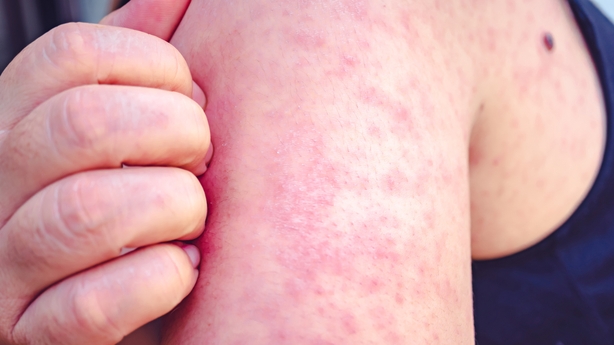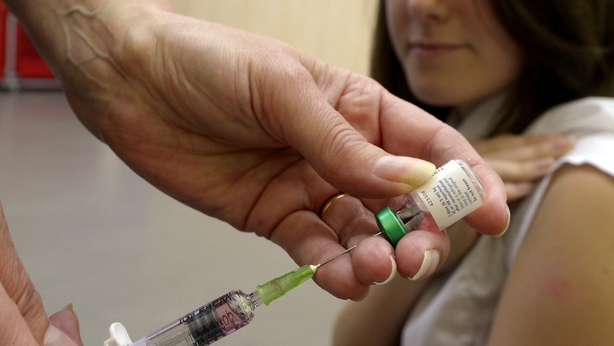Minister for Health Stephen Donnelly is to tell cabinet colleagues this afternoon that there is a high likelihood of a measles outbreak in Ireland over the coming months.
It follows what the World Health Organization (WHO) has described as an “alarming” rise in measles cases in Europe, with at least 42,200 cases reported in 2023 compared to 941 cases in 2022.
Several public health specialists and doctors who have spoken to Prime Time agreed with the assessment which Minister Donnelly is presenting, and expressed concern about the potential impact.
“Without a doubt, we will see cases [in Ireland]…the real question is going to be what the knock-on spread of those is going to be, how big the outbreak is going to be,” Pediatric Infectious Diseases Consultant Cilian O Maoldomhnaigh working in Children’s Health Ireland said.
Measles is a highly infectious disease that can lead to hospitalisation, disability and even death in children.
The MMR vaccine (which covers measles, mumps and rubella) has been available in Ireland since 1985.
“In terms of levels of efficacy, the estimate with two doses of the measles vaccine it’s probably 99% effective. It doesn’t just block disease in the individual, it seems to also really significantly reduce transmission,” Professor of Vaccine Immunology at Trinity College Dublin Ed Lavelle said.
Doctors say the vaccination rates have been falling in recent years and are now currently below the uptake level needed to prevent community outbreaks.
The WHO and other health bodies say 95% of a population needs to have had the MMR vaccine to achieve and maintain herd immunity. The further rates fall below that threshold, the higher the risk of outbreaks and likelihood of large outbreaks.

MMR vaccines are given in two doses – the first dose is given when a child is typically 12 months old and the second in their first year in primary school, when the child is four or five years old.
According to the most recent data from the Health Protection Surveillance Centre (HPSC) vaccination rates in Ireland for the first dose of the MMR vaccine have fallen to 89.2%. Their release meant the numbers have been below 90% for six consecutive quarters, the first time this has happened since 2008.
Rates also vary by area, with Louth and Meath seeing vaccination rates drop below 80% while rates in Dublin South West are at 94.4%.
Vaccination rates for the second dose, usually given at school, are also falling nationally. The latest HPSC data, which cover 2021 to 2022, shows uptake of 87.5% in schools and 86.3% in areas where a GP administers the second dose.
Uptake rates were decreasing before the pandemic but fell “markedly” from the year 2019/2020 to 2020/2021, according a HPSC report. Rates fell from 91.1% to 88.0% in schools and from 90.3% to 88.1% in GP practices, during those years.
Professor Lavelle says the trend is “very concerning.”
“Twenty years ago, people were talking about global eradication of measles… and now you’re trying to really stem the tide of increasing incidence of measles.”
“It was done, it was effective, it was rolled out, and now we were going backwards,” he added.
Experts who spoke to Prime Time cite a range of reasons for why fewer people are getting their children vaccinated, but most concerns relate could be grouped under the headings of ‘complacency’ or ‘misinformation.’
Complacency
Complacency around the disease itself is one of the main reasons, according to Niall Conroy, Consultant in Public Health Medicine and Health Protection and Adjunct Professor of Public Health at University College Cork.
“Measles hasn’t been a feature of life in Ireland for many years,” Dr Conroy says, which has led people to believe measles is “relatively benign illness.”
“As someone who has unfortunately treated hundreds of cases of measles in my career and been in the centre of quite a few measles outbreaks, I can tell you that is far from the reality.”

Dr Conroy worked in public health in Somalia in 2015. During that time there was a spike in measles cases and he saw the impact of low vaccination rates in children.
“At best, measles makes children really, really, miserable and gives them a high fever for a few days,” Dr Conroy said.
“I’ve seen lots of kids die of measles, and lots of kids become very unwell with it. It’s most definitely not a disease that we should be complacent about,” he said.
Measles can also lead to very painful ear infections, measles pneumonia and – in rarer cases – encephalitis, which is a very serious swelling of the brain.
Dr O Maoldomhnaigh, who works across CHI Crumlin and Temple Street, says there’s an element of “collective forgetfulness” when it comes to measles and vaccination.
“When we aren’t seeing the immediate danger of these things, you’re less inclined to do it, and that’s natural,” he added.
Dr Scott Walkin, who works as a GP in Sligo and Mayo, agrees.
“When vaccines are so effective that they reduce the incidence of illness very substantially, it’s just human nature that ‘out of sight’ is ‘out of mind’. And… we can become a little bit complacent about them,” he told Prime Time.
The issue is that measles is not only serious, it is highly contagious, according to Prof Lavelle, even more so than flu or the virus that causes Covid-19.
“One infected individual might, on average, infect twelve other individuals,” he said.
“When you have a situation where globally [vaccination] levels are declining, then if people are travelling and they come back… you have the chance of outbreaks happening.”
Dr O Maoldomhnaigh adds during lockdowns, “people weren’t getting kids vaccinated because they weren’t leaving the house and they weren’t attending GPs.”
“It was also a situation where viruses just weren’t spreading in the community, so people had less of a reason to attend GPs and it’s probably less on people’s minds,” he added.
Vaccine misinformation
Misinformation is also a significant issue when it comes to vaccines in general, according to Dr Conroy.
The MMR vaccine in particular has been the subject of misinformation and damaging false claims which have resulted in serious measles outbreaks and deaths.
Most notably, in 1998 British gastroenterologist Andrew Wakefield published a study in the Lancet medical journal that attempted to link the MMR vaccine to autism.
The study received massive media attention globally in the years after publication, and a small number of Irish doctors publicly backed the conclusions. However, the findings were later disproved.
In 2010, the study was retracted from the Lancet and Mr Wakefield was struck off the medical register in the UK.

“I think there probably are some people that are not aware that the Andrew Wakefield concerns about MMR, that those concerns have been shown to be completely without foundation whatsoever,” Dr Walkin says.
“It can be very difficult to put the genie back in the bottle… there is [still] an element of a residual effect,” he added.
In 2000, an outbreak of measles in Ireland, which Dr O Moaldohmnaigh says was linked to the prominence of the Wakefield paper, led to hundreds of children being hospitalised and the death of three children.
“There are certainly vulnerable populations still now, young adults, who are vulnerable as part of that kind of Wakefield generation,” Dr O Maoldomhnaigh says.
A 2023 study by the HPSC’s National Serosurveillance Programme, which estimates and monitors rates of immunity in Ireland estimated that 10.7% of adults aged 18-34 are non-immune to measles.
For males aged 18-19 years, who were born in 2003-2004, this number jumps to 17.9%. This variation is not seen in females, according to the report.
The “discredited research” that linked the MMR vaccine and autism “may have resulted in widespread vaccination hesitancy affecting vaccination uptake,” the report says.
“Parental behaviours regarding MMR immunisation of their children differed for males than females, as they may have been influenced by public perceptions of overall autism risk being higher in males.”
Now based in the US, Mr Wakefield is a prominent figure in anti-vaccination campaigns, and regained increased attention during the pandemic.
The misinformation stemming from his original retracted study still influences a cohort of parents of young children now, Dr Conroy said.
“Sometimes this stuff just sticks with people, and they elect to either take some time to think about vaccination or to take the – as they see it – least risky approach of avoiding vaccination.”
During the Covid-19 pandemic, general anti-vaccination sentiment and misinformation gained significant traction and attention, particularly online.
“Vaccine misinformation was often piggy-backed onto general conspiracy theory messaging,” Dr Conroy added.
“We definitely saw a decrease in trust in the childhood immunisation programme worldwide during Covid [but] there was no new [scientific] issue with routine vaccination during the pandemic, so most of this is likely because general anti-public health misinformation was ratcheted up.”
“For people who aren’t familiar with the enormous body of safety and effectiveness data around vaccines like the MMR, it can be easy to be taken in by people with impressive-sounding credentials and convincing graphics,” Dr Conroy added.
Behind most cases of misinformation, he says, there’s usually “well-meaning people misrepresenting data that they haven’t analysed properly or more malignant figures using misinformation to drive clicks on their social media platforms”
“In both cases, the end result is that children suffer.”
Source link
 TG4 TV PC to TV
TG4 TV PC to TV
